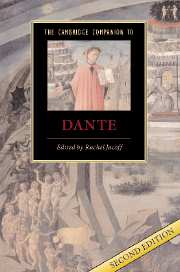Book contents
- Frontmatter
- 1 Life of Dante
- 2 Dante and the lyric past
- 3 Approaching the Vita nuova
- 4 From auctor to author: Dante before the Commedia
- 5 Introduction to Inferno
- 6 Introduction to Purgatorio
- 7 Introduction to Paradiso
- 8 Dante and the Bible
- 9 Dante and the classical poets
- 10 Allegory and autobiography
- 11 A poetics of chaos and harmony
- 12 The theology of the Comedy
- 13 The poetry and poetics of the creation
- 14 Dante and Florence
- 15 Dante and the empire
- 16 Dante and his commentators
- 17 Dante in English
- Further reading
- Index
- Series List
12 - The theology of the Comedy
Published online by Cambridge University Press: 28 May 2007
- Frontmatter
- 1 Life of Dante
- 2 Dante and the lyric past
- 3 Approaching the Vita nuova
- 4 From auctor to author: Dante before the Commedia
- 5 Introduction to Inferno
- 6 Introduction to Purgatorio
- 7 Introduction to Paradiso
- 8 Dante and the Bible
- 9 Dante and the classical poets
- 10 Allegory and autobiography
- 11 A poetics of chaos and harmony
- 12 The theology of the Comedy
- 13 The poetry and poetics of the creation
- 14 Dante and Florence
- 15 Dante and the empire
- 16 Dante and his commentators
- 17 Dante in English
- Further reading
- Index
- Series List
Summary
The Comedy is a poem of ends. Its central question is one of the central questions of all Christian theology: what is humanity's end and how do we attain to it? Unlike most theological treatises, however, the poem begins from this end, with two of the traditionally named Four Last Things: Heaven and Hell. Inasmuch as the location of the Comedy's characters in either one of these realms or in Purgatory presupposes a determination regarding salvation, a third of the Last Things is anticipated, namely judgment, although this has not formally been rendered in the time of the poem. The first of the Last Things, death, is also presupposed for the majority of the figures in the poem, with the exception of the demons and angels, the pilgrim himself, and the few proleptically damned of whom the pilgrim hears in Inferno. These Last Things, conventionally among the final subjects treated in a systematic theology, are the point from which the Comedy begins: in the middle of the pilgrim's life, but beyond the final moral determination of his human characters. The end of the narrative of the shades' earthly lives becomes the basis for a theological exploration of the end of human life as the vision of God.
The immediate prompt for the entire poem is however Dante's own end: it is out of concern for what may become of him that Virgil is asked to guide the pilgrim through the world of the shades so that he may not be lost, at risk as he apparently is.
- Type
- Chapter
- Information
- The Cambridge Companion to Dante , pp. 201 - 217Publisher: Cambridge University PressPrint publication year: 2007
- 2
- Cited by

